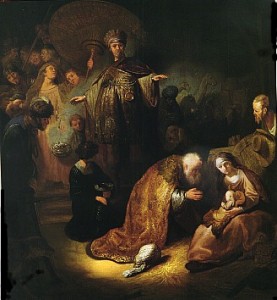As we march toward the remembrance of Jesus on Good Friday and Resurrection Sunday, consider again the scene in the Garden of Gethsemane.

See Him there, prayerfully wrestling with the suffering that lay before Him and the eternal realities that depended upon Him. Having called His Disciples to watch and pray, He stumbled forward, “fell on his face and prayed, saying, ‘My Father, if it be possible, let this cup pass from me; nevertheless, not as I will, but as you will’” (Matt. 26:39). He rises. He finds the Disciples sleeping. He calls them again to watchful vigilance. Again He withdrew, crying out, “My Father, if this cannot pass unless I drink it, your will be done” (v.42). Once again, He rises. Again, He finds the Disciples sleeping. Yet again, He withdrew and “prayed for the third time, saying the same words again” (v.44).
Clearly Jesus was wrestling with what the will of His Father required of Him. It made Him “very sorrowful.” So deep was His grief that He thought it might be the death of Him just trying to pray through it all (v.38). Jesus clearly wished for the Disciples to join Him in His struggle that would soon become their struggle. He wanted them to be prepared.
Almost immediately Judas and the arresting mob arrived in the Garden (vv.46-47). The betrayal by kiss (vv.47-50a). The brief, bloody skirmish (vv.50b-51). The rebuke by Jesus of His Disciples (v.52).
Consider then Jesus’ response both to the Disciples for their impetuous fighting and to the arresting mob in their blind arresting. Jesus reminded the Disciples that He could have called on His Father for a host of angel-warriors and been delivered from this entire affair (v.53). His next breath is telling: “But how then should the Scriptures be fulfilled, that it must be so?” (v.54).
No long later Jesus similarly rebuked the arresting authorities with a question about the timing and circumstances of their actions (v.55). Then He said, “But all this has taken place that the Scriptures of the prophets might be fulfilled” (v.56).
Jesus’ response to both the Disciples and the arresting party was the same – there was no other way for Him (and them) to fulfill what the Scriptures revealed as the Father’s will. As Jesus struggled with the Father’s will, it was against what He knew the Father had described as His will in the Scriptures.
Picture it! Jesus, if you will, was struggling in prayer over an open Bible as it held before Him the difficult nature of His Father’s will.
It makes me wonder, will I so pray through what the Scriptures require of me as a disciple of Jesus Christ? Will I come to the same place of submission to the Father’s will?

When God’s Word is open before me, holding forth what God requires of me, am I bowed to its authority over me? Am I bowed over that open Bible, praying through what it holds before me, where necessary, weeping and wrestling with my own will and self-preservation? Do I come to the same conclusion as Jesus? Do I say, as Jesus did, “Rise, let us be going” and take the next step of obedience my Father, through his written Word, holds before me?
As difficult as that next step in your discipleship with Jesus may be, He understands—from experience—just what you are going through (Heb. 2:18; 4:15). He too uttered “loud cries and tears” in this struggle (Heb. 5:7). But “for the joy that was set before him” He took the next painful step of obedience (Heb. 12:2). And because He did, so can you, by His Spirit dwelling within you.




